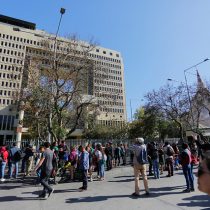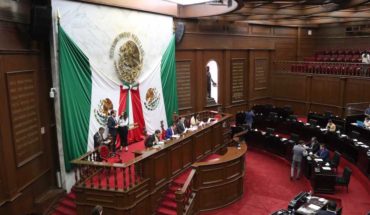
On March 11, 1990, everyone wanted to be part of a democracy that left behind a relentless dictatorship and systematic human rights violations. The political world was fully deployed, but Legislative Journalism was also born. A branch of journalism that today marks 30 years of good times and bad times. And that sticking to the vocabulary of the writings of the various media could be described as a communication challenge of incalculable dimensions.
And while, to this day, there are no precise definitions. Legislative Journalism can be explained as a type of journalism that interprets the Legislative Power, analyzes the political repercussions of decision makers, investigates, transparents and enforces the law. Unveiling the various faces of power.
A type of journalism that emerged to inform the public, in such a way as to refine public policies and monitor.
Fundamental actor to chain the Leviathan or state, and make democracy stronger than ever. Because the fourth power in the Senate, in the Chamber of Deputies and through the various governments from 1990 to date, it is aware that without the role of legislative journalism, it is very difficult to build a solid rule of law.
A journalistic adventure that has left an important mark on the history of Chile and national journalism. In describing and analyzing the political processes after the end of the dictatorship and the advent of democracy.
Taking relevant steps to self-educate in the specialized legislative political world, when even the National Congress of Valparaiso was not fully built, as they recounted in various aisle conversations, prominent correspondents Fidel Oyarzo, Berta Morales, Gonzalo Cruzat, Iván Delgado and Pepe Manríquez.
Great journey accompanied by many journalistic investigations and press milestones around the privatizations of the dictatorship, the presence of the dictator in the Senate or the drug case, in the framework of a convulsive transition. Space of time that allowed to concrete a necessary modernization in the way of reporting and generating content from the Legislative Power.
And that it also improved the tools to intensify the audit of the administrative acts of the presidency of the Chamber of Deputies; the debate over the Divorce Act and the repeated campaigns to secure press freedom in the mazes of parliament.
History of Legislative Journalism that noted the end of the senators appointed, the constitutional reforms of 2005 and the legislative political consequences of the Spiniak case. A political tsunami with epicenter in the legislative headquarters of Valparaiso, which ended with the Anti-Padophilia Law.
Certainly a period of great changes for legislative journalism that he found as allies, very significant laws to deal with corruption such as the Lobbying Act and the Transparency Act. And the birth of digital legislative journalism accompanied by radio media and TV as the number one format.
Generating a cultural change in the country, but at the same time, in the idiosyncrasies of Congressjournalists. Because it is clear, according to the very doctrine of the reporters of the Legislative Power, the headquarters of parliament is a school for quality journalism. And understand the origin of political, economic journalism and be able to cover in an outstanding way The Currency.
That way, it’s like the Legislative Power and the press faces the first administration led by a woman as President of the Republic and the first right-wing government. A stage highlighted by the beginning of the end of the Concertación, the division of the opposition and the end of the binominal electoral system, which had as journalists protagonist Paula Bravo, Fidel Oyarzo, Paola Riquelme, José Miguel Wilson, José Luis Riffo, Marcela Jiménez , Angela Meneses, Alejandro Trujillo, Claudio Salinas, Yelka Catalán and Guillermo Navarro.
A paradigmshift change in legislative journalism, because it meant the rise of deputies and senators, and the arrival of new political conglomerates such as the FA and Evópoli with supposed new ways of seeing legislative and public policy . Although they have ended up operating in the same way as traditional parties and their legislative benches.
A real shock for journalism linked to the National Congress that had to interpret new oppositions, listen to other leadership, understand an emerging digital revolution, the deployment of cross-platform media and the impact of serious corruption cases .
Situation that re-impacted Legislative Journalism, transforming it into a more intense, fiscalizing and incisive journalism. In many cases, forcing the journalist to study and analyze in depth each of the political processes, considering information technologies. And transform into a journalistic unit since Congress by communicating and reporting via WhatsApp, Twitter, Instagram and Facebook. A change led by journalists Jorge Espinoza, Daniela Astudillo, Oscar Cáceres, Claudia Rivas, Germán Gatica, Rienzi Franco and Kevin Felgueras.
30 years of the Legislative Journalism of Chile that today faces its maximum challenge. To improve democracy always attached to truth, freedom of the press and with the ability to investigate and transparent all those facts that affect Chilean society and its legitimate demands.
Because Legislative Journalism is not just politics or economics. It is much more important, because they are the eyes of citizenship in the National Congress and the future of Chile.
A journalistic footprint that since Congress has been forged by more than 500 professionals, according to the statistics of the Legislative Power itself.
A path that must be built for the country by sharply analyzing social and political processes. That is why I approve and relieve the value of Legislative Journalism without pressure, independent and always thinking of the common good with freedom and equality.
The content poured into this opinion column is the sole responsibility of its author, and does not necessarily reflect the editorial line or position of El Mostrador.





